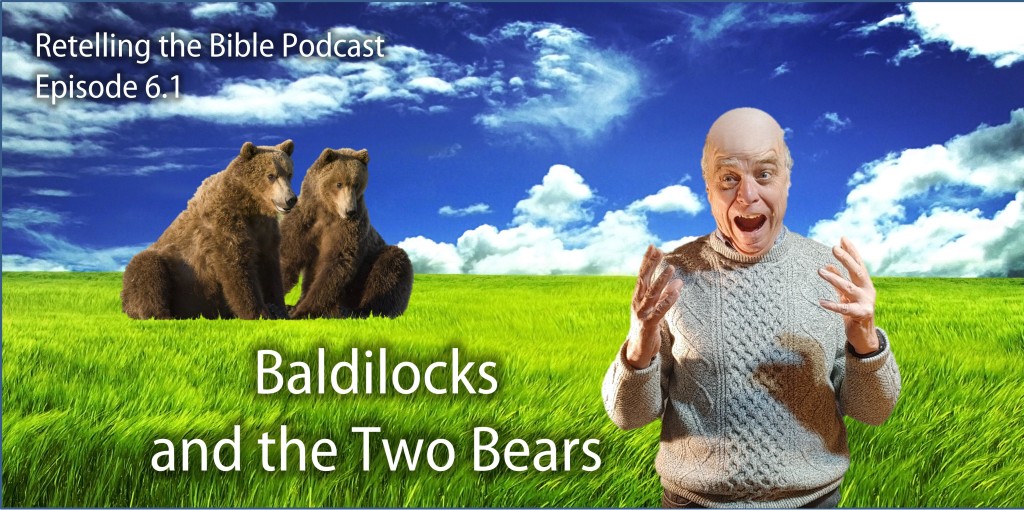The first action-packed episode of the sixth season of the Retelling the Bible Podcast is posted today (January 12, 2022). It retells the story of how the Prophet Elisha cursed a bunch of kids who were mocking him and how they were subsequently killed by two bears.
You can listen to the story right now and subscribe to the podcast by following one of these links or by searching for the podcast on your favourite platform:
Show Notes about the Story
The story of Elisha, his healing of the spring, the children and the bears is told in 2 Kings 2:19-25. Any direct biblical quotations in the episode are taken from the New Revised Standard Version.

The Prophetic Movement
The prophet Elijah and his disciple and successor Elisha are fascinating figures. Their stories are only told in the books of First and Second Kings and there is really no way to verify the historicity of these individuals.

They do seem to have been part of a movement, however, that did verifiably play an important role in the history of the people of Israel. Prophets clearly did exist in ancient Israel and many of their oracles and pronouncements have been preserved for us as a part of the scriptures.
The stories of Elijah and Elisha do depict these two men as part of a larger movement that is often called The Company of the Prophets (in the Hebrew, they are literally called The Sons of the Prophets)
This movement, in many of the stories at least, seems to act as a challenge and gadfly to the power of the various kings of Israel and Judah. Though, at times, often in matters of international relations, we do see the prophets giving aid and support to the kings.
A few choices
I did make a few choices in order to make some narrative sense of this story. In many ways, the stories of the miracles of the Prophet Elisha seem to be independent short stories that might have circulated independently of one another in some kind of oral tradition. There doesn’t seem to be any necessary connection from one story to the next. Nevertheless, I chose to treat the story of the contaminated spring as being connected to the subsequent story of the bears.
In addition, the story about the spring follows immediately after some events that take place in Jericho and there is no reference to the prophet actually leaving Jericho. This might imply that the incident with the spring happened at Jericho, but I chose not to treat it that way.
The story of the spring is also the first miracle story of Elisha and I chose to treat that as if this were not merely an accident of placement but to tell it as a story of Elisha experiencing the role of a prophet (without support) for the first time.
Go up, Baldy
Like this character in Monty Python’s Life of Brian, the Prophet Elisha was apparently “afflicted with a bald patch.” The only reference to the affliction comes in this odd episode where he is mocked by children.
Some have suggested that, perhaps, prophets regularly shaved their heads as a sign of their profession and that this might explain why the taunting was so egregious. But, given that this would be the only reference to such a practice, the theory seems unlikely to me. I assumed that the man was just naturally balding and was, perhaps, sensitive about it.
In the Hebrew text, what the children literally say in order to taunt the prophet is, “Go up, bald head.” I have sometimes seen this explained by some scholars or preachers as a follow-up to the story of the ascension of the prophet Elijah into heaven in 2 Kings 2:1-18. He has, after all, just been taken up into heaven following the incident with the Chariot of fire. And so, some have suggested, the children meant to taunt the prophet by suggesting that he should take the same route up into heaven that his master has just taken.
I suppose that is a possible interpretation, but I thought that a simpler explanation was to take the destination that we are given in the actual text. We are told that, at this time, Elisha was on his way to Bethel, which would have been considered a high place or sanctuary and it seems that it was the common parlance to speak of “going up” to a high place. This seems to be a more obvious explanation for the use of the preposition “up.”
Correlation and Causation
The story of the marauding bears raised some interesting questions of causality for me. The story tells of one thing that happened after another — a wild animal attack after a curse. The clear implication of the story is that the attack was caused by the curse, but the closer I looked at the story, the less clear that implication seemed to be.
It is a natural human tendency, especially when we live through a traumatic experience, to seek for some cause or reason for it. This makes it very easy for us to want to see things that happen in a sequence as a matter of cause or effect. The fact of the matter is that this passage does not actually say why the bears attack, it only strongly implies it based on the coincidence that one thing happened after another. I chose to try and see how this kind of connection could have been made by exploring the story narratively.
Music in this Episode
AhDah Kevin MacLeod (incompetech.com)
Licensed under Creative Commons: By Attribution 3.0 License
http://creativecommons.org/licenses/by/3.0/
Grand Dark Waltz Moderato by Kevin MacLeod
Link: https://incompetech.filmmusic.io/song/7923-grand-dark-waltz-moderato
License: https://filmmusic.io/standard-license
Grand Dark Waltz Allegro by Kevin MacLeod
Link: https://incompetech.filmmusic.io/song/7921-grand-dark-waltz-allegro
License: https://filmmusic.io/standard-license
One thought on “6.1 Baldilocks and the Two Bears”